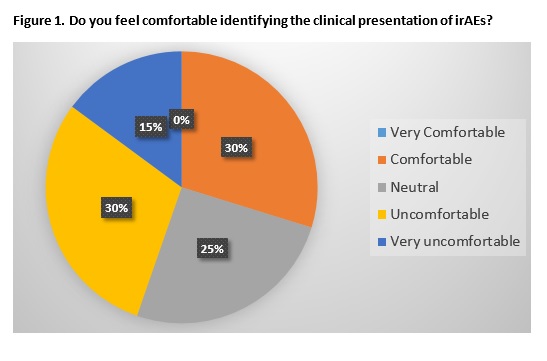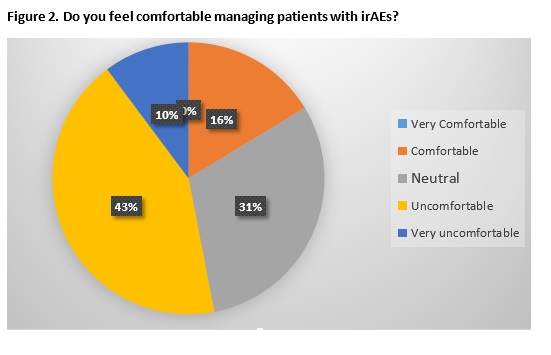Session Information
Date: Monday, November 9, 2020
Session Type: Poster Session D
Session Time: 9:00AM-11:00AM
Background/Purpose: The introduction of immunologic checkpoint inhibitor therapy (ICI) has caused a paradigm shift in the world of cancer treatment. Their use, however, is attended by a slew of untoward, off-target effects that appear to be autoimmune and/or autoinflammatory in origin called immune related adverse events (irAEs), which pose diagnostic and management challenges. With the increasing use ICI for a growing number of indications, more health care providers are encountering patients with irAEs in outpatient clinic, the emergency room and the hospital wards. While education on irAEs amongst non-oncologists has improved on some fronts1, we believe there still remain large knowledge gaps. We developed a survey to assess awareness and experience with ICI and irAEs amongst hospitalists
Methods: An online survey was generated using SurveyPlanet and distributed via e-mail to the population of hospitalists at the Cleveland Clinic Main Campus and The Ohio State Wexner School of Medicine. The survey questions aimed to assess hospitalists’ awareness surrounding ICI and irAEs including whether they had encountered these patients in the hospital, what types of irAEs were encountered, and comfort level with identifying and managing irAEs. A data use agreement between Cleveland Clinic and The Ohio State Wexner Medical Center was completed.
Results: The survey was sent to 90 hospitalists at the Cleveland Clinic and 92 hospitalists at The Ohio State Wexner School of Medicine with a response rate of 49/182 (27%). The majority of responders (61.2%) were between the ages of 30-40, and 28.6% were aged 40-50. Most were aware of ICIs and irAEs. 24/49 (49%) had encountered an irAE in the hospital, most often involving the gastrointestinal tract, lung or skin. Only about a third felt comfortable identifying the clinical presentation of irAEs (29.8%) and even fewer felt comfortable managing (16.3%) irAEs (Figures 1 and 2). Most expressed desire for more resources to learn about diagnosis and treatment of irAEs, with preferred tools being online learning modules (23/44), grand rounds (16/44), webcast (4/44) and other (3/44).
Conclusion: irAEs represent a new area of medicine that requires multidisciplinary collaboration for optimal management. New educational resources will be required for all medical professionals encountering these patients, including hospitalists.
References:
- Kostine M, Cappelli LC, Calabrese C, et al. Addressing immune-related adverse events of cancer immunotherapy: how prepared are rheumatologists? Annals of Rheumatic Disiease 2018. In press.
 Figure 1. Do you feel comfortable identifying the clinical presentation of irAEs?
Figure 1. Do you feel comfortable identifying the clinical presentation of irAEs?
 Figure 2. Do you feel comfortable managing patients with irAEs?
Figure 2. Do you feel comfortable managing patients with irAEs?
To cite this abstract in AMA style:
Calabrese C, Meara A, Janamanchi V. Immune Related Adverse Events from Checkpoint Inhibitor Therapy: Survey of Hospitalists’ Awareness and Experiences [abstract]. Arthritis Rheumatol. 2020; 72 (suppl 10). https://acrabstracts.org/abstract/immune-related-adverse-events-from-checkpoint-inhibitor-therapy-survey-of-hospitalists-awareness-and-experiences/. Accessed .« Back to ACR Convergence 2020
ACR Meeting Abstracts - https://acrabstracts.org/abstract/immune-related-adverse-events-from-checkpoint-inhibitor-therapy-survey-of-hospitalists-awareness-and-experiences/
